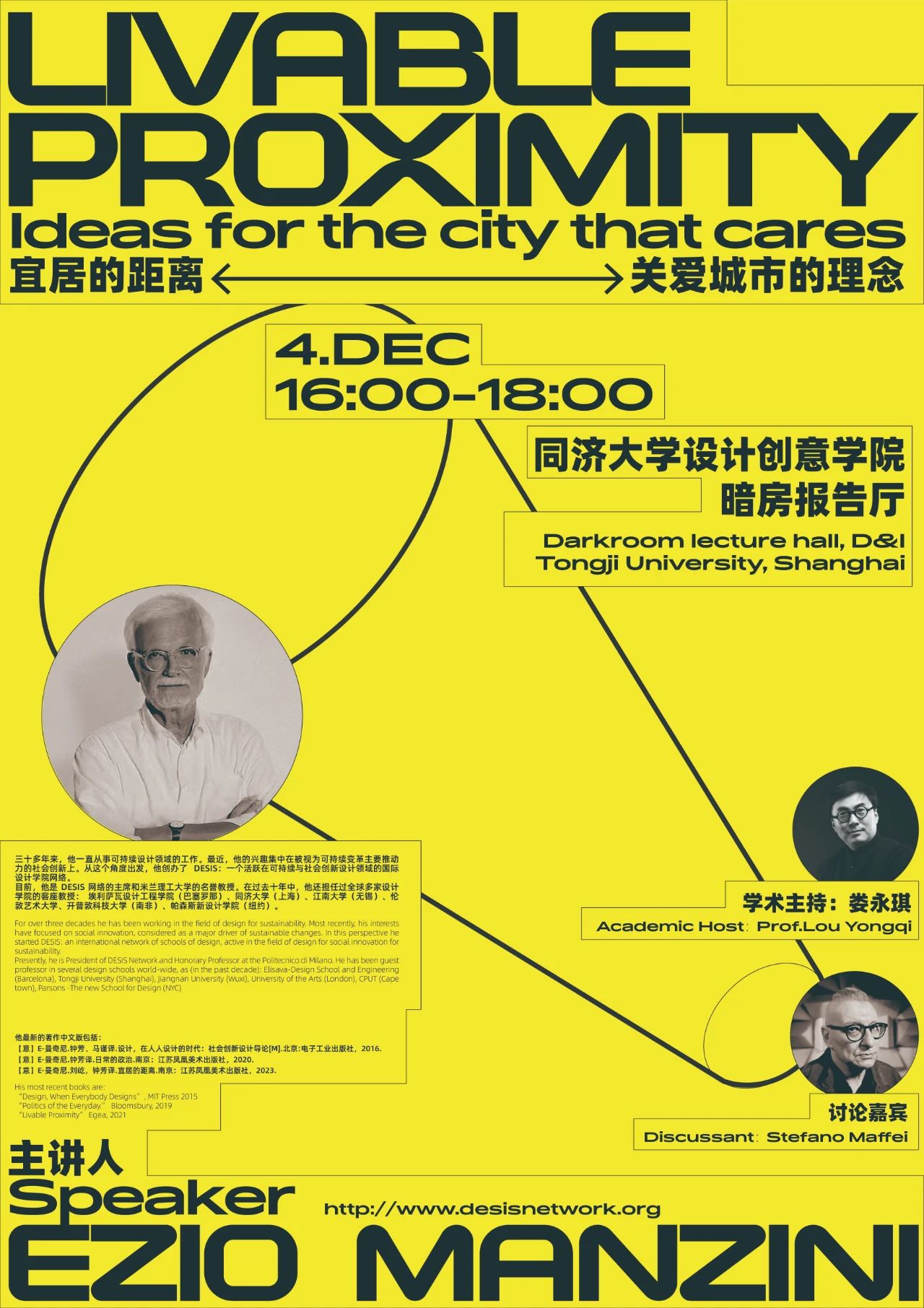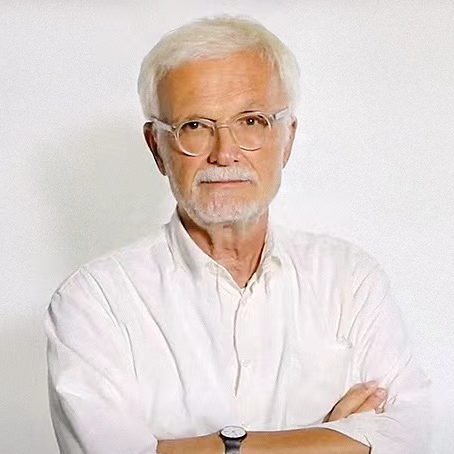


时 间
2023年12月4日(周一)
16:00 至 18:00
December 4th (Monday),16:00-18:00
地 点
同济大学设计创意学院 暗房报告厅
Darkroom Lecture Hall
College of Design and Innovation
*讲座面向校内外所有人员开放
亦可点击预约线上直播
↓↓↓

学术主持

娄永琪
同济大学副校长、教授,瑞典皇家工程科学院院士
演讲嘉宾

Ezio Manzini
DESIS发起人,米兰理工大学荣休教授
讨论嘉宾

Stefano Maffei
米兰理工大学设计学院教授
主 题
宜居的距离-关爱城市的理念
Livable proximity: Ideas for the city that cares
在过去的一个世纪里,现代社会的空间组织一直受到以专业化和规模经济为基础的效率理念的影响。以效率和卫生的名义,一些地区已经专门化:工作的地方、娱乐的地方、学习的地方、睡觉的地方。我们可以把这一切称为远距离的居住。
然而,随着时间的推移,人们清楚地认识到,这种方案正在导致非常严重的环境和社会问题。因此,长期以来,这种模式开始与其他想法和做法发生冲突,因为人们需要把分离的东西集中起来,把断开的东西重新连接起来。也就是说,要把服务、工作场所和人们的家更紧密地联系在一起。这些新的理念和实践,即这些社会创新,可以被视为一个新的新兴方案的开端:宜居的“附近”方案。
尽管远距离社会的问题很早就显现出来,但直到 2019 年,导致定义 "附近情景 "的想法和做法才慢慢取得进展。然后,新冠大流行来了,矛盾的是,它所要求的卫生距离同样向每个人展示了实际距离的重要性:邻里服务的社会作用;在居住地附近工作的优势;与隔壁租户保持良好关系的重要性。总之,越来越多的人和机构认识到了邻里关系的价值。
本讲座将讨论这种近距离情景,说明它是如何从过去 20 年的基层社会创新中产生的,以及在一些城市,它是如何成为一种行动参考,有时使用“15 分钟城市”的说法,创建新的近距离系统,能够满足公民的许多(如果不是全部)日常需求。
演讲嘉宾Ezio Manzini 三十多年来一直从事可持续设计领域的工作。最近,他的兴趣集中在被视为可持续变革主要推动力的社会创新上。从这个角度出发,他创办了DESIS:一个活跃在可持续与社会创新设计领域的国际设计学院网络。
目前,他是DESIS网络的主席和米兰理工大学的名誉教授。在过去十年中,他还担任过全球多家设计学院的客座教授:埃利萨瓦设计工程学院(巴塞罗那)、同济大学(上海)、江南大学(无锡)、伦敦艺术大学、开普敦科技大学(南非)、帕森斯新设计学院(纽约)。
他最新的著作中文版包括:
【意】E·曼奇尼.钟芳、马谨译. 设计,在人人设计的时代:社会创新设计导论[M]. 北京:电子工业出版社,2016.
【意】E·曼奇尼.钟芳译. 日常的政治. 南京:江苏凤凰美术出版社,2020.
【意】E·曼奇尼.刘屹,钟芳译. 宜居的距离. 南京:江苏凤凰美术出版社,2023.
In the past century the spatial organization of modern societies has been dominated by the effects of an idea of efficiency based on specialization and economy of scale. In the name of efficiency and hygiene, some areas have specialized: those where to work, those where have fun, those where study, those where go back to sleep. We can refer to all of this as the scenario of livable distance.
Over time, however, it clearly emerged that the application of this scenario was leading to very serious environmental and social problems. Therefore, since long time some cases appeared in which this model began to clash with other ideas and practices, driven by the need to bring together what had been separated and to reconnect what had been disconnected. That is, to bring services, workplaces and people's homes closer together. These new ideas and practices, i.e. these social innovations, con be seen as the beginning of a new, emerging scenario: the scenario of livable proximity.
Although the problems of the society of distance were evident since long time, until 2019, the ideas and practices that had led to the definition of the scenario of proximity have slowly advanced. Then the pandemic arrived and, paradoxically, the same sanitary distancing it required has shown everyone how important physical proximity is: the social role of neighborhood services; the advantage of working close to where you live; the importance of having good relationships with the tenants next-door. In short, the value of the scenario pf proximity has been recognized by a growing number of people and institutions.
The lecture discusses this scenario of proximity, showing how it has emerged from the grassroots social innovations of the past 20 years, and how, in some cities, it has become a reference for action, sometimes using the expression “15-minute city”, with the creation of new proximity systems capable of responding to many, if not all, the daily needs of citizens.
For over three decades he has been working in the field of design for sustainability. Most recently, his interests have focused on social innovation, considered as a major driver of sustainable changes. In this perspective he started DESIS: an international network of schools of design, active in the field of design for social innovation for sustainability.
Presently, he is President of DESIS Network and Honorary Professor at the Politecnico di Milano. He has been guest professor in several design schools world-wide, as (in the past decade): Elisava-Design School and Engineering (Barcelona), Tongji University (Shanghai), Jiangnan University (Wuxi), University of the Arts (London), CPUT (Cape town), Parsons -The new School for Design (NYC).
His most recent books are: “Design, When Everybody Designs” MIT Press, 2015; “Politics of the Everyday” Bloomsbury, 2019; “Livable Proximity” Egea, 2021.
